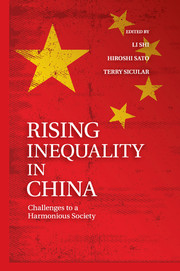Book contents
- Frontmatter
- Contents
- List of Tables
- List of Figures
- Contributors
- Preface
- Abbreviations
- Glossary
- 1 Rising Inequality in China
- 2 Overview
- 3 Housing Ownership, Incomes, and Inequality in China, 2002–2007
- 4 Educational Inequality in China
- 5 Inequality and Poverty in Rural China
- 6 The Evolution of the Migrant Labor Market in China, 2002–2007
- 7 A New Episode of Increased Urban Income Inequality in China
- 8 Unemployment and the Rising Number of Nonworkers in Urban China
- 9 Do Employees in the Public Sector Still Enjoy Earnings Advantages?
- 10 Redistributive Impacts of the Personal Income Tax in Urban China
- 11 Changes in the Gender-Wage Gap in Urban China, 1995–2007
- 12 Intertemporal Changes in Ethnic Urban Earnings Disparities in China
- Appendix I The 2007 Household Surveys
- Appendix II The 2002 and 2007 CHIP Surveys
- Index
Preface
Published online by Cambridge University Press: 05 July 2013
- Frontmatter
- Contents
- List of Tables
- List of Figures
- Contributors
- Preface
- Abbreviations
- Glossary
- 1 Rising Inequality in China
- 2 Overview
- 3 Housing Ownership, Incomes, and Inequality in China, 2002–2007
- 4 Educational Inequality in China
- 5 Inequality and Poverty in Rural China
- 6 The Evolution of the Migrant Labor Market in China, 2002–2007
- 7 A New Episode of Increased Urban Income Inequality in China
- 8 Unemployment and the Rising Number of Nonworkers in Urban China
- 9 Do Employees in the Public Sector Still Enjoy Earnings Advantages?
- 10 Redistributive Impacts of the Personal Income Tax in Urban China
- 11 Changes in the Gender-Wage Gap in Urban China, 1995–2007
- 12 Intertemporal Changes in Ethnic Urban Earnings Disparities in China
- Appendix I The 2007 Household Surveys
- Appendix II The 2002 and 2007 CHIP Surveys
- Index
Summary
This book is the product of a long-term research effort supported through the years by many individuals and organizations. In the late 1980s, Keith Griffin and Zhao Renwei brought together a team of Chinese and international researchers to organize the first in a series of nationwide household surveys that are now known as the China Household Income Project (CHIP) surveys. Their goal was to collect household survey data that would make possible meaningful empirical analysis of trends in incomes, inequality, and poverty in post-Mao China. In the mid-1990s, Zhao Renwei and Carl Riskin took the lead in organizing a second round of the survey, and in the early 2000s Björn Gustafsson, Li Shi, and Terry Sicular organized a third round.
In the mid-2000s, the editors of this book, together with Meng Xin, organized a fourth round of the survey. The fourth CHIP survey took place in 2008 and gathered data for the year 2007. This round was carried out in conjunction with the Rural-Urban Migration in China and Indonesia (RUMiCI) project. As in earlier rounds, data collection was closely integrated with research analysis. This book contains analyses of incomes, inequality, and poverty based on the 2007 CHIP survey data; most chapters in this volume also use data from one or more of the earlier rounds.
Information
- Type
- Chapter
- Information
- Rising Inequality in ChinaChallenges to a Harmonious Society, pp. xxi - xxiiPublisher: Cambridge University PressPrint publication year: 2013
